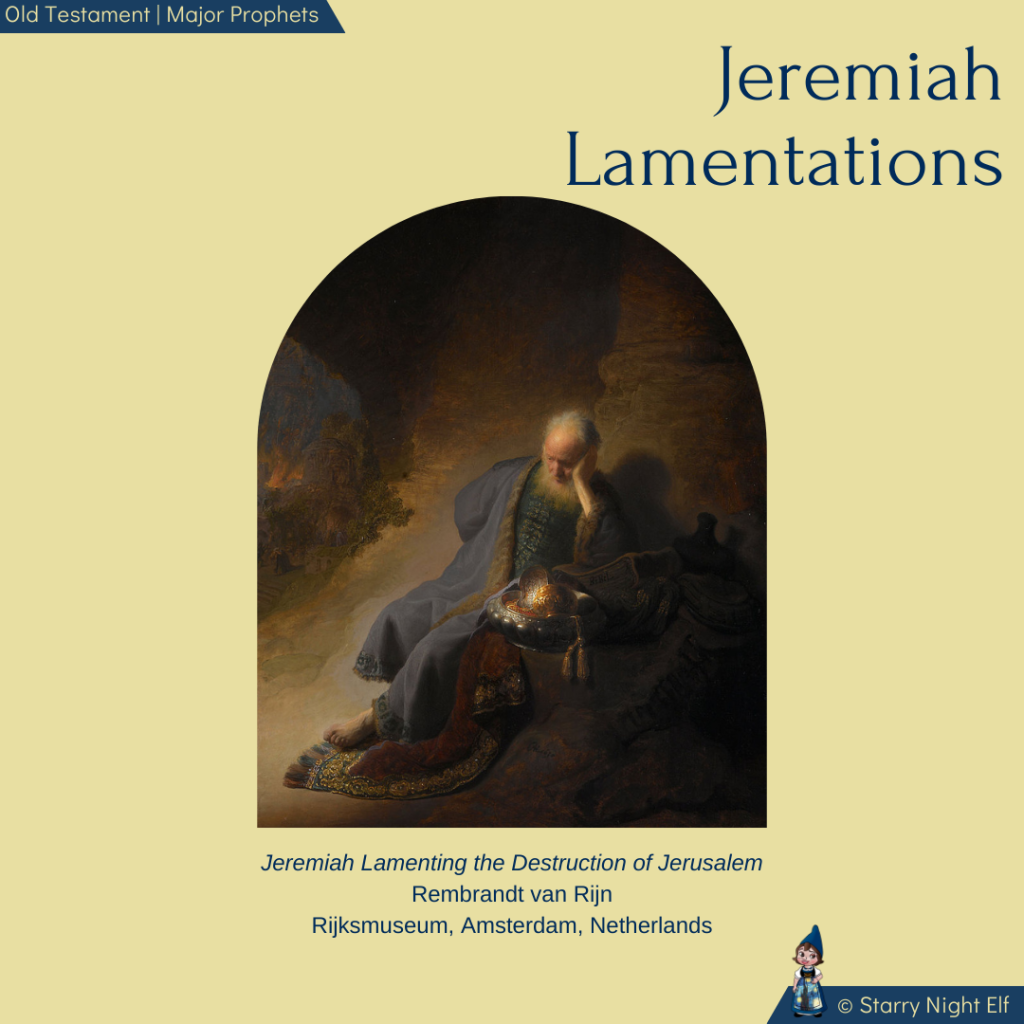
Painting Image Source: Rijkmuseum | © Starry Night Elf
Part of a series of Starlight Book Reviews (SBR) on Old Testament (OT) Books. Click here to see other OT SBR.
* The following post transparently exhibits my Christian faith.
The Major Prophets is a grouping of books in the Christian Old Testament that does not occur in the Hebrew Bible. All of these books are traditionally regarded as authored by a prophet such as Jeremiah, Isaiah, Daniel, and Ezekiel. The term “major” has nothing to do with the achievement or importance of the prophets, rather with the length of the books. In comparison to the books of the Twelve Minor Prophets, whose books are short and grouped together into one single book in the Hebrew Bible, these books are much longer.
5/5 Gnomies, I continue my Starlight Book Reviews (SBR) for the 2023 Sacred Texts Journey Stellar Reading Challenge (SRC). This SBR pertains to the Major Prophets Books of Jeremiah and Lamentations. Jeremiah, known as the Weeping Prophet, wrote both of these books.
Click here to check out the Sacred Texts Journey SRC.
“The Book of Jeremiah (Hebrew: ספר יִרְמְיָהוּ) is the second of the Latter Prophets in the Hebrew Bible, and the second of the Prophets in the Christian Old Testament. The superscription at chapter Jeremiah 1:1–3 identifies the book as “the words of Jeremiah son of Hilkiah”.Of all the prophets, Jeremiah comes through most clearly as a person, ruminating to his scribe Baruch about his role as a servant of God with little good news for his audience… His book is intended as a message to the Jews in exile in Babylon, explaining the disaster of exile as God’s response to Israel’s pagan worship:the people, says Jeremiah, are like an unfaithful wife and rebellious children, their infidelity and rebelliousness made judgment inevitable, although restoration and a new covenant are foreshadowed.Authentic oracles of Jeremiah are probably to be found in the poetic sections of chapters 1 –25, but the book as a whole has been heavily edited and added to by the prophet’s followers (including, perhaps, his companion, the scribe Baruch) and later generations of Deuteronomists.”
“The Book of Lamentations (Hebrew: אֵיכָה, ʾĒḵā, from its incipit meaning “how”) is a collection of poetic laments for the destruction of Jerusalem in 586 BCE. The Book of Lamentations (Hebrew: אֵיכָה, ʾĒḵā, from its incipit meaning “how”) is a collection of poetic laments for the destruction of Jerusalem in 586 BCE. In the Hebrew Bible it appears in the Ketuvim (“Writings”) as one of the Five Megillot (or “Five Scrolls”) alongside the Song of Songs, Book of Ruth, Ecclesiastes and the Book of Esther although there is no set order. In the Christian Old Testament it follows the Book of Jeremiah, as the prophet Jeremiah is its traditional author… Some motifs of a traditional Mesopotamian “city lament” are evident in the book, such as mourning the desertion of the city by God, its destruction, and the ultimate return of the divinity; others “parallel the funeral dirge in which the bereaved bewails… and… addresses the [dead]”. The tone is bleak: God does not speak, the degree of suffering is presented as overwhelming, and expectations of future redemption are minimal. Nonetheless, the author repeatedly makes clear that the city, and even the author himself, have profusely sinned against God, justifying his wrath. In doing so the author does not blame God but rather presents him as righteous, just, and sometimes even as merciful.”
When I set out to write SBR of the Major Prophets and Minor Prophets, I left out Lamentations of the equation. In the end, I decided to include the smaller in the review with the much larger Jeremiah due to authorship. While uneasy and put off by reading these two books, I saw yet again how I often glean something new to me. With complete realization that Jeremiah wrote both of these books, I now get why Jeremiah and Lamentations reside next to one another in the Bible. They go “hand in hand.” I look forward to reading these books again (and again) in the years to come.
A couple of verses which stood out in my 2023 reading of these books:
11 For I know the plans I have for you,” declares the Lord, “plans to prosper you and not to harm you, plans to give you hope and a future.
Jeremiah 29:11 NIV
22 Because of the Lord’s great love we are not consumed,
Lamentations 3:22 NIV
for his compassions never fail.
Select Bibliography (Alphabetical Order by Author’s Surname)
- Allen, Leslie C. (2008). Jeremiah: A Commentary. Westminster John Knox Press. ISBN 9780664222239.
- Berlin, Adele (2004). Lamentations: A Commentary. Westminster John Knox Press. ISBN 9780664229740.
- Hayes, John H. (1998). “The Songs of Israel”. In McKenzie, Steven L.; Graham, Matt Patrick (eds.). The Hebrew Bible Today: An Introduction to Critical Issues. Westminster John Knox Press. ISBN 9780664256524.
- Kugler, Robert; Hartin, Patrick (2009). The Old Testament between theology and history: a critical survey. Eerdmans. ISBN 9780802846365.
- Sweeney, Marvin A. (1998). “The Latter Prophets”. In Steven L. McKenzie, Matt Patrick Graham (ed.). The Hebrew Bible today: an introduction to critical issues. Westminster John Knox Press. ISBN 9780664256524.
